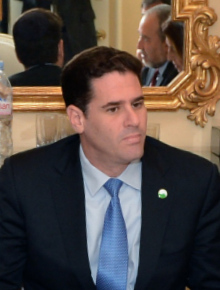A Quote by Adel al-Jubeir
As long as Iran's aggressive policies continue, it's going to be bad for the region. Iran has to decide whether it wants a revolution or a nation-state.
Related Quotes
If the six-nation forums dealing with Iran and North Korea suffer comparable failures, the consequence will be a world of unchecked proliferation, not controlled by either governing principles or functioning institutions. A modern, strong, peaceful Iran could become a pillar of stability and progress in the region. This cannot happen unless Iran's leaders decide whether they are representing a cause or a nation - whether their basic motivation is crusading or international cooperation. The goal of the diplomacy of the Six should be to oblige Iran to confront this choice.
After the revolution of 1979, Iran embarked on a policy of sectarianism. Iran began a policy of expanding its revolution, of interfering with the affairs of its neighbors, a policy of assassinating diplomats and of attacking embassies. Iran is responsible for a number of terrorist attacks in the Kingdom, it is responsible for smuggling explosives and drugs into Saudi Arabia. And Iran is responsible for setting up sectarian militias in Iraq, Pakistan, Afghanistan and Yemen, whose objective is to destabilize those countries.
My reading of the threat from Iran is that if Iran acquires nuclear weapons, it is an existential threat to the State of Israel and to other countries in the region because the other countries in the region will feel compelling requirement to acquire nuclear weapons as well. Now we cannot a second Holocaust.
General [James] Mattis has said that the deal's in place. We can't unilaterally pull out of it without support from our allies because the sanctions wouldn't bite as deeply. And so he'll find other ways to push back against Iran in the various conflicts that Iran is fomenting around the [Iran] region.
Iran is a powerful country. Iran is a big country with a large population, natural resources, human resources. But we are a country that is content with its size, content with its geography. We have not engaged in any military adventures in the past 250 years. We don't see any of this as Iran trying to dominate this region. We see some people panicking in our region and we believe there is no need to panic. We are prepared to work with all our neighbors to ensure the security and prosperity of our region.
The Republicans are whistling past the graveyard. If we don't change our policies on immigration, you're going to be looking at Iran Deal after Iran Deal after Iran Deal. I can count on Americans to protect Israel. I don't count on foreigners to care about Israel, and that's who's coming in to vote.
Many countries that formerly saw Israel as an enemy now see Israel as a potential partner in addressing their primary security challenges. And so first and foremost, Iran. The rise of Iran, the empowerment of Iran has created a big change in the dynamics in the region. The second was the rise of ISIS.
We support any deal that denies Iran nuclear weapons, that has a continuous and robust inspection mechanism and that has snap-back provisions in case Iran violates the agreement. Our concern is that Iran will use the income it receives as a result of the lifting of the nuclear sanctions in order to fund its nefarious activities in the region.
Turkey's relations with its immediate neighbors are improving. They were pretty bad for a long time - with Syria they were abominable, and with Iran they were pretty bad. In both cases Turkey sees potential for trade, especially with Iran, where it gets a lot of natural gas. In good times Iran and Turkey find mutually profitable objects of exchange, but with Syria things have been very bad; Syria doesn't have much money and never will.
When I came into office, the world was divided. Iran was resurgent. Iran is at its weakest point, economically, strategically, militarily, then since - then in many years. And we are going to continue to keep the pressure on to make sure that they do not get a nuclear weapon. That's in America's national interest and that will be the case so long as I'm president.
In order to threaten Iran, you [America] say that you can secure the energy flow in the region. You are wrong. Beware that if you make the slightest mistake over Iran, the energy flow through this region will be seriously endangered. You will never be capable of providing energy security in this region. You are not capable and you should know this.






























